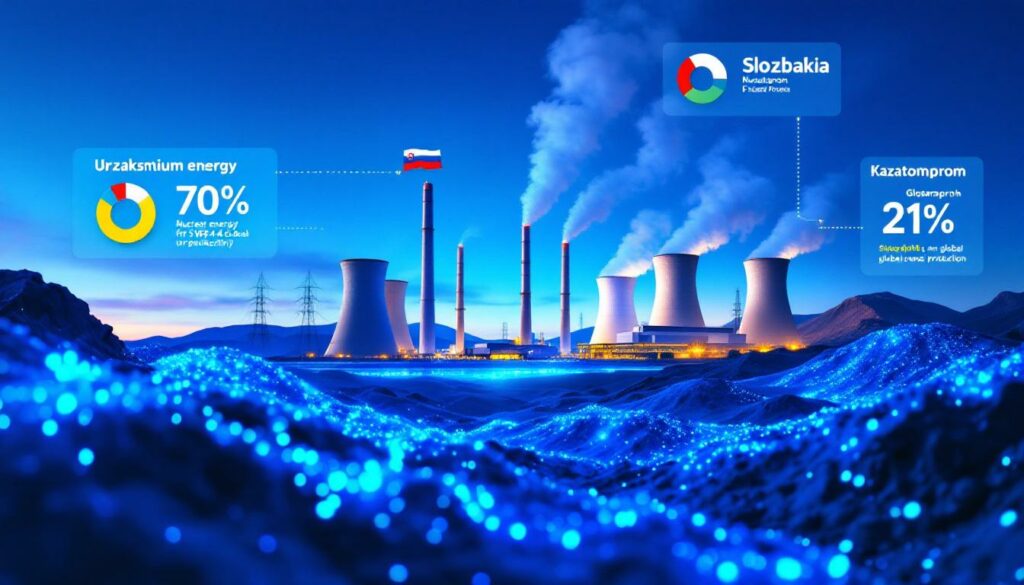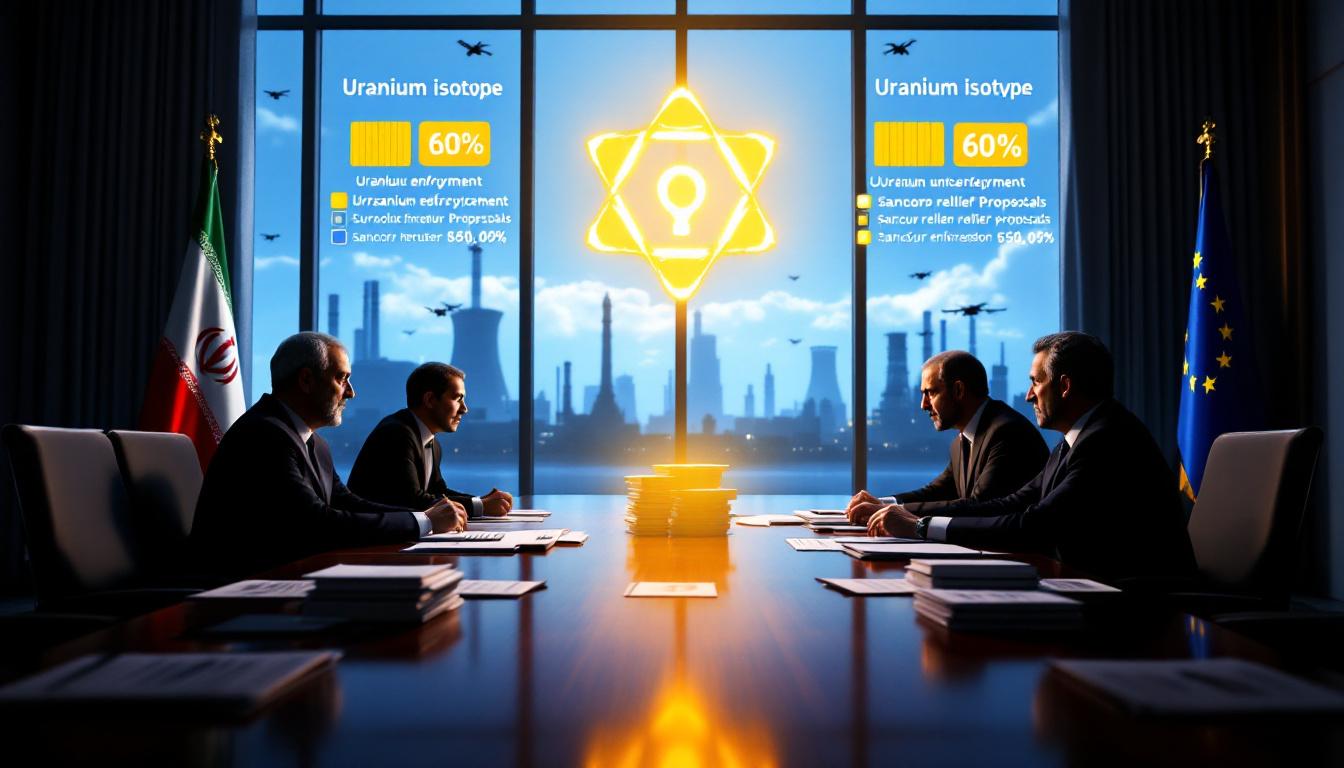What is the Strategic Significance of Kazatomprom's Uranium Deal with Slovakia?
Kazakhstan's national atomic company Kazatomprom has signed a pivotal Memorandum of Understanding (MOU) with Slovenské Elektrárne (SE), marking a significant expansion of uranium supply relationships between Central Asia and the European Union. This agreement represents more than just a business transaction—it's a strategic energy security arrangement with implications for both nations and the broader European energy landscape.
Understanding Kazakhstan's Growing Role in European Nuclear Fuel Supply
The partnership between Kazatomprom and SE comes at a critical juncture in European energy politics. As Europe reassesses its energy dependencies and security frameworks, Kazakhstan has emerged as a reliable alternative supplier of nuclear fuel components.
Branislav Strycek, CEO and Board Chairman of SE, emphasized the "strategic importance of diversifying nuclear fuel supply sources" when announcing the agreement, highlighting that energy diversification has become a matter of national security for Slovakia.
Key Agreement Details and Strategic Timing
The MOU establishes a framework for long-term cooperation with two primary components:
- Supply of natural uranium concentrate to support Slovakia's operational nuclear fleet
- Potential future deliveries of uranium dioxide (UO₂), a higher value-added product in the nuclear fuel cycle
This agreement is specifically designed to support Slovakia's five operational VVER-440 reactors across the Bohunice and Mochovce nuclear power plants, which together form the backbone of the country's electricity generation capacity.
The timing of this deal is particularly significant as it follows a series of similar agreements between Kazatomprom and other European utilities, suggesting a coordinated shift in European nuclear fuel procurement strategies.
Slovakia's Nuclear Energy Profile and Supply Needs
Slovakia stands out among European nations for its extraordinary reliance on nuclear energy:
- Over 70% of Slovakia's total electricity comes from nuclear power, making it one of the most nuclear-dependent countries in the world
- The country operates five VVER-440 reactors—Russian-designed pressurized water reactors that require specialized fuel
- Slovenské Elektrárne has a unique ownership structure with Slovak Power Holding holding 66% and the Slovak government retaining 34%
For a country so dependent on nuclear energy, fuel supply security isn't merely an economic consideration—it's a fundamental national interest. The Kazatomprom in Slovakia uranium supply deal helps reduce Slovakia's vulnerability to supply disruptions that could potentially affect over two-thirds of its electricity generation capacity.
How Does This Deal Fit into Kazatomprom's Global Strategy?
The agreement with Slovakia represents another strategic step in Kazatomprom's deliberate expansion into European markets, complementing its established position in Asian and North American uranium supply chains.
Kazatomprom's Market Position and Growth Trajectory
Kazatomprom has established itself as the dominant force in global uranium production through consistent expansion of production capacity and strategic market positioning.
Global Production Leadership
The company's market position is defined by several key metrics:
- World's largest producer of natural uranium with approximately 21% of global primary uranium production as of 2024
- Generated $3.4 billion in uranium and related product sales in 2024
- Achieved an impressive 26.4% year-on-year increase in revenue performance
- Operates primarily through environmentally-friendly and cost-effective ISL uranium production methods
This financial and production strength provides Kazatomprom with the capability to reliably fulfill long-term supply contracts with multiple major markets simultaneously—a critical consideration for utility companies managing nuclear fuel inventories.
European Market Expansion Strategy
The Slovakia agreement represents part of a methodical European expansion strategy, following several other recent partnerships:
- Romania: Discussions with SN Nuclearelectrica on a potential 10-year supply contract and cooperation on beryllium processing (May 2025)
- Czech Republic: Agreement with ČEZ for uranium supply to the Temelín Nuclear Power Plant (April 2025)
- Switzerland: Contract established with Axpo Power AG and Kernkraftwerk Leibstadt AG (February 2025)
Meirzhan Yussupov, CEO of Kazatomprom, underscored this strategy when announcing the Slovakia deal: "By signing this memorandum we are taking an important step towards strengthening cooperation with our European partners. Nuclear energy plays a key role in ensuring sustainable energy supply in Slovakia. We believe this memorandum will lay the foundation for strong and mutually beneficial relations between our companies."
This progression of agreements demonstrates Kazatomprom's systematic approach to establishing itself as a key uranium supplier for the European market, diversifying its customer base beyond its traditional markets in Asia and North America.
Why Are European Nations Diversifying Uranium Supply Sources?
European energy security concerns have accelerated dramatically in recent years, with nuclear fuel supply emerging as a critical priority for nations maintaining or expanding nuclear power programs.
Energy Security Considerations in the Nuclear Sector
The push for supply diversification stems from several interconnected factors affecting Europe's energy landscape:
Reducing Supply Chain Vulnerabilities
European utilities are implementing multifaceted strategies to enhance nuclear fuel security:
- Critical mineral security awareness has grown substantially, with uranium joining the list of strategically important resources requiring secure supply chains
- Nations are pursuing a strategic shift away from concentrated supply dependencies that could leave them vulnerable to disruptions
- Nuclear fuel supply diversification has evolved from a business practice to a national security priority
- Utilities are developing balanced portfolios that maintain traditional supply relationships while establishing new partnerships
This shift reflects broader recognition that energy security requires resilient, diverse supply chains that can withstand geopolitical pressures or market disruptions. For Slovakia—with nuclear providing over 70% of its electricity—the stakes of this diversification effort are particularly high.
European Energy Transition Context
The diversification of nuclear fuel suppliers is occurring against the backdrop of Europe's broader energy transition:
- Nuclear power maintains a crucial role in many national decarbonization strategies, particularly for countries seeking to phase out coal while maintaining reliable baseload generation
- Long-term planning for stable, low-carbon electricity requires secure fuel supplies for existing reactor fleets
- Countries with established nuclear sectors are preparing for potential new nuclear capacity additions, including both conventional reactors and emerging technologies like SMRs
- The EU's energy security framework increasingly recognizes the importance of nuclear fuel cycle independence
For Slovakia and other nuclear-dependent European nations, establishing reliable, diverse uranium supply chains represents a critical foundation for both current operations and future energy development plans.
What Makes Kazakhstan an Attractive Uranium Supply Partner?
Kazakhstan's emergence as Europe's partner of choice for uranium supply diversification stems from several unique advantages that position it favorably compared to other potential suppliers.
Kazakhstan's Uranium Industry Advantages
The country offers a combination of geological abundance, technical expertise, and established reliability that makes it particularly attractive as a strategic partner.
Production Capacity and Resource Base
Kazakhstan's uranium industry benefits from exceptional natural and developed advantages:
- The country possesses substantial uranium reserves primarily located in the Chu-Sarysu and Syrdarya basins
- Its industry has developed extensive production infrastructure across multiple mining sites
- Kazakhstan has mastered cost-effective extraction methods, primarily in-situ leach (ISL) mining, which offers both economic and environmental advantages over conventional mining
- The country has built an established track record of reliable supply commitments through challenging market conditions
- Kazakhstan's uranium sector has developed significant technical expertise in uranium processing and handling
These attributes combine to make Kazakhstan not just a capable supplier, but one with substantial capacity to expand production to meet growing demand—an important consideration for utilities planning long-term fuel security.
International Trade Relationships
Kazakhstan has skillfully developed a balanced global portfolio of uranium supply relationships:
- The country maintains major supply relationships with China, Russia, Canada, US, and France—spanning the world's largest nuclear energy markets
- Its growing portfolio of European partnerships demonstrates flexibility in adapting to evolving market demands
- Kazakhstan has proven its ability to meet international quality and regulatory standards required by diverse markets
- The country enjoys strategic positioning between major Eastern and Western markets, allowing it to serve as a bridge in global uranium supply chains
This balanced approach to international partnerships positions Kazakhstan as a politically neutral supplier—an important consideration for European utilities seeking to reduce geopolitical risk in their fuel supply chains.
How Might This Agreement Impact Slovakia's Energy Future?
The Kazatomprom agreement provides Slovakia with enhanced flexibility and security for its nuclear-centric energy system, potentially influencing both near-term operations and long-term energy planning.
Implications for Slovakia's Nuclear Sector
The partnership creates several important advantages for Slovakia's energy landscape:
Supply Chain Resilience Benefits
For Slovakia's nuclear fleet, the agreement offers multiple strategic advantages:
- Enhanced fuel supply security for existing reactors through supplier diversification
- Potential cost advantages through competitive sourcing in a market that has historically been dominated by limited suppliers
- Reduced vulnerability to supply disruptions that could otherwise impact the country's dominant electricity source
- A foundation for potential nuclear fleet expansion by establishing reliable fuel access
These benefits directly address the priorities emphasized by SE's leadership when announcing the agreement, particularly regarding supply diversification as a strategic imperative.
Long-term Energy Planning Considerations
Beyond immediate supply security, the agreement influences Slovakia's broader energy strategy:
- Support for Slovakia's continued reliance on nuclear energy as its primary electricity source
- Alignment with European energy security objectives focused on reducing external dependencies
- Potential framework for future nuclear development projects, including possible reactor lifetime extensions or new builds
- Strengthening of Slovakia's energy independence by diversifying key supply relationships
For a country that relies on nuclear energy for over 70% of its electricity, establishing multiple reliable fuel supply partnerships represents a foundational element of national energy security planning.
What Are the Broader Market Implications of This Deal?
The Kazatomprom-Slovakia agreement reflects and reinforces several important trends reshaping the global uranium market dynamics, with potential long-term effects on market structure and pricing dynamics.
Global Uranium Market Dynamics
The deal exemplifies broader shifts occurring in uranium procurement practices worldwide:
Supply Diversification Trends
Multiple parallel developments are reshaping uranium supply chains:
- A noticeable shift in traditional uranium supply relationships as utilities reassess dependencies
- The growing importance of Kazakhstan in European supply chains, expanding beyond its traditional markets
- Intensifying competitive positioning among uranium-producing nations seeking long-term utility contracts
- The evolution of nuclear fuel procurement strategies to prioritize security and stability alongside cost
These trends suggest a market undergoing structural change, with implications for both producers and consumers of uranium worldwide.
Market Structure Evolution
The industry is seeing fundamental changes in how uranium is traded and contracted:
- Increasing direct producer-utility relationships that bypass traditional intermediaries
- Reduced reliance on intermediaries in uranium supply chains
- Strong preference for long-term contracts in uncertain market conditions rather than spot market purchasing
- The replacement of transactional relationships with strategic partnerships that encompass broader cooperation
The Slovakia agreement exemplifies this shift toward direct, strategic relationships between producers and end-users—a model that may become increasingly dominant in the uranium market.
FAQ: Kazatomprom-Slovakia Uranium Supply Agreement
What exactly did Kazatomprom and Slovenské Elektrárne agree to?
The companies signed a Memorandum of Understanding outlining intentions for long-term cooperation, primarily focusing on natural uranium concentrate supply with potential for uranium dioxide deliveries and additional collaboration areas.
How significant is nuclear power in Slovakia's energy mix?
Nuclear energy generates more than 70% of Slovakia's total electricity, making it a critical component of the country's energy security and baseload power generation.
What percentage of global uranium production does Kazatomprom control?
As of 2024, Kazatomprom's attributable production represented approximately 21% of global primary uranium production, making it the world's largest producer.
Is this agreement part of a broader pattern for Kazatomprom?
Yes, this agreement follows similar recent partnerships with Romania's SN Nuclearelectrica, Czech energy company ČEZ, and Swiss firms Axpo Power AG and Kernkraftwerk Leibstadt AG, indicating a strategic expansion into European markets.
What benefits does Slovakia gain from this partnership?
The agreement helps Slovakia diversify its nuclear fuel supply sources, potentially reducing costs, enhancing energy security, and establishing a foundation for future nuclear development.
Future Outlook for Uranium Supply Partnerships
The Kazatomprom in Slovakia uranium supply deal offers insights into how uranium supply relationships may evolve in coming years, pointing toward more integrated, strategic partnerships.
Emerging Trends in Nuclear Fuel Procurement
Several key developments are likely to shape future uranium supply arrangements:
Strategic Resource Relationships
The uranium market is moving toward more comprehensive partnership models:
- Growing emphasis on bilateral supply agreements between producers and utilities
- Increasing importance of government-to-government frameworks that establish political support for commercial deals
- Integration of uranium supply into broader energy cooperation agreements
- Development of more comprehensive nuclear fuel cycle partnerships that extend beyond raw uranium supply
These evolving relationship structures reflect the strategic importance attached to nuclear fuel supply security by both producing and consuming nations.
Market Evolution Expectations
Looking forward, several developments appear likely in global uranium markets:
- Potential for more direct producer-utility agreements following the model established by Kazatomprom
- Likely expansion of Kazakhstan's European market share as diversification efforts continue
- Possible development of new uranium processing capabilities to capture more value from the nuclear fuel cycle
- Evolution toward more integrated nuclear fuel supply chains with closer coordination between mining, conversion, enrichment, and fabrication
These trends suggest a market evolving toward greater integration, stability, and strategic alignment—moving away from the more commoditized, transactional model that has historically characterized uranium trade.
Furthermore, the uranium mining halt in Namibia by companies like Paladin Energy further emphasizes the importance of reliable suppliers like Kazakhstan in the global uranium supply chain. Additionally, the US uranium import ban impact and potential US market disruption risks highlight why European utilities are actively seeking stable supply partnerships outside of traditional channels.
Further Exploration:
Readers interested in learning more about international uranium supply agreements can also explore additional perspectives on global nuclear fuel supply dynamics at Nuclear Engineering International, which offers comprehensive coverage of the Kazakhstan-Slovakia uranium supply agreement.
Want to Identify the Next Major Uranium Discovery Before the Market?
Discovery Alert's proprietary Discovery IQ model provides instant notifications on significant ASX uranium discoveries, empowering you to capitalise on opportunities ahead of the broader market. Explore why major mineral discoveries can lead to exceptional returns by visiting our dedicated discoveries page.




